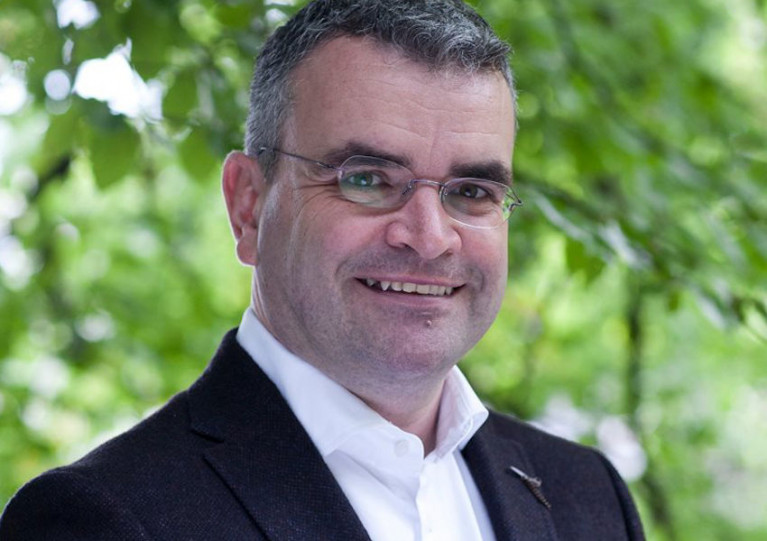Displaying items by tag: Dara Calleary
Minister for Agriculture, Food and Marine Dara Calleary has tendered his resignation with immediate effect, after attending an event in Clifden, Co Galway, just a day after new Covid-19 measures were introduced.
The Fianna Fáil Mayo TD, who had only recently been appointed to the post after the sacking of Barry Cowen, has apologised for his attendance at an Oireachtas Golf Society event on Wednesday.
Taoiseach Micheál Martin will take responsibility for the agriculture, marine and food brief until a successor is appointed. However, there have been calls this morning for a recall of the Dáíl.
The Irish Examiner had reported that Mr Calleary was one of 81 people who attended the event in memory of late Fianna Fáíl MEP Mark Killilea.
It reported that guests were separated in two separate rooms at Clifden’s Station House Hotel.
Last night I attended a function I committed to a number of weeks ago, to pay tribute to a person I respected and admired greatly. In light of the updated public health guidance this week I should not have attended the event. I wish to apologise unreservedly to everyone 1/2
— Dara Calleary (@daracalleary) August 20, 2020
EU Commissioner Phil Hogan, Seanad leas-Cathaoirleach Jerry Buttimer, and Galway West Independent TD Noel Grealish were among a number of other politicians present, along with recently retired RTE broadcaster Seán O’Rourke.
Minister for Education Norma Foley said this morning on RTÉ Radio’s Morning Ireland that Mr Calleary made "a very serious error of judgement" by attending the function, while Labour TD for Dublin North Aodhán Ó Ríordáin called for a Garda investigation into the hosting of the event and recall of the Dáil.
Mr Ó’Riordan told RTÉ that all the individuals who attended the event did so "in a stunningly arrogant fashion".
He said Mr Hogan needs to make a statement to explain why he felt it was appropriate for him to attend the event, and also if he followed public health guidelines on restricting movements for 14 days after returning to Ireland from Brussels.
On Tuesday, the Government announced new restrictions to halt the spread of Covid-19, which included limits on social gatherings and stated no formal or informal events or parties should be held in restaurants, cafes and hotel restaurants.
Mr Calleary (47), Fianna Fáil deputy leader and a seasoned representative for the west coast county of Mayo, had been serving as Chief Whip in the new coalition government.
When he appointed him to replace Barry Cowen, Mr Martin said that Mr Calleary would be a “very effective minister”, and would deliver on challenges facing the agriculture sector, including Brexit, climate change and the renegotiations of the EU Common Agricultural Policy.
Mr Calleary, from a strong political family in Ballina, Co Mayo, promised to be a “voice for the west” and one that “will not be a quiet voice” in Cabinet.
His predecessor Barry Cowen had spent just over a fortnight in office in the new coalition government which was formed in late June by Fianna Fáil, Fine Gael and the Green Party when he resigned.
After The Irish Independent reported he had incurred a drink-driving ban in 2016, Mr Cowen apologised in the Dáil and appeared to have the backing of his party leader.
However, several days after further allegations were published by The Sunday Times – which Mr Cowen challenged and said he was taking legal advice on – he was sacked.
A spokesman forT he Station House Hotel told The Irish Examiner that it had consulted the Irish Hotels Federation (IHF), which informed it that the event could go ahead with less than 50 people in each side of the room.
There was a physical partition between both rooms, the spokesman told the newspaper.
An email from the IHF to members on Wednesday, seen by the Examiner, stated: "Further to the Government announcement yesterday in relation to further Covid-19 restrictions, the Department of Tourism has not yet received any guidance on the changes as of this morning. Therefore, the status quo remains in terms of current operational procedures for hotels until further notice."
More on The Examiner here
Dara Calleary Is Ireland’s New Marine Minister
Dara Calleary has been named as the new Minister for Agriculture and the Marine following last night’s dramatic sacking of Barry Cowen from the post.
RTÉ News reports on the new appointment confirmed today (Wednesday 15 July) by Taoiseach Micheál Martin, with the Fianna Fáil TD for Mayo promoted from his brief as chief whip and junior minister for the Gaeltacht.
Calleary’s predecessor as Marine Minister was removed just two weeks into the post amid controversy surrounding a fine for drink-driving in 2016.






























































